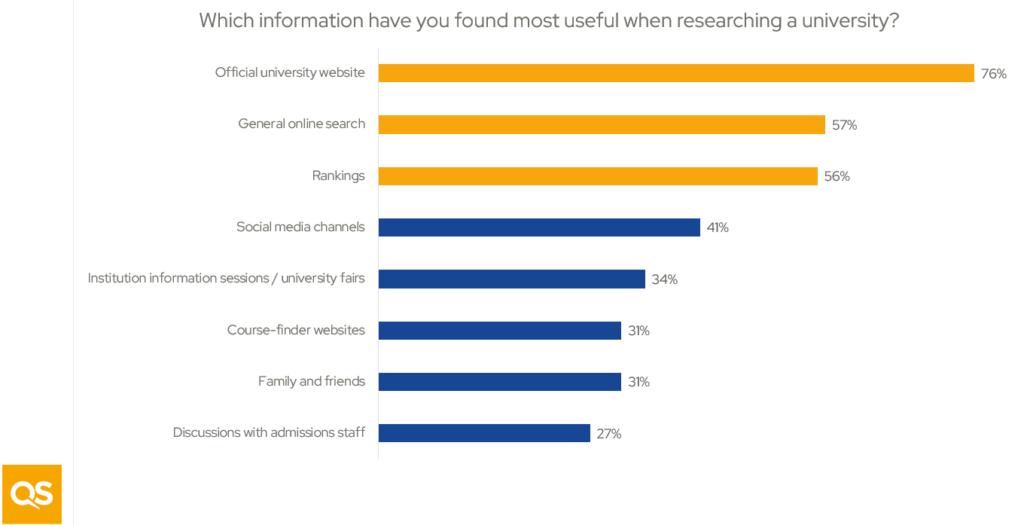
Engaging today’s values-driven students can be the key to achieving university sustainability goals
Universities have a significant stake in advancing social good by educating future leaders, fostering research that addresses societal challenges, and serving as hubs for community engagement and cultural development. Today’s generation of students place more emphasis on aligning their study and career decisions with their values. 88% of prospective students saying that sustainability is important to their decision making (QS International Student Survey 2024).
Ainslie Moore, Global President for the Climate Action Network for International Educators (CANIE), believes that amplifying sustainability initiatives with students helps universities leverage their greatest asset as key agents of change.
“In doing so, universities accelerate progress toward their own sustainability targets while supporting the global effort to achieve the UN’s Sustainable Development Goals,” she said. “Through education, innovation, and community engagement, universities and their students contribute to a sustainable future for all.”
Are universities encouraging students’ values-driven mindset to support sustainability goals, by creating experiences that produce sustainably conscious graduates equipped to tackle global challenges?
Mapping sustainability across the student journey
There is an opportunity for institutions to maximise their environmental and social sustainability efforts and connect with students in a more meaningful way to make change. For Deborah McAllister, Global Vice-President at CANIE, it begins with mapping out sustainability efforts across the institution onto the entire student journey from enquiry through to graduation.
“If universities can marry sustainability activities to the different stages of the student journey and understand where they can pull out areas of student concern and expectation and need, they can create a more cohesive and impactful sustainability strategy that not only aligns with institutional goals but also resonates with students on a personal level.
“This approach ensures that sustainability isn’t just a policy or initiative but a lived experience throughout their time at university, fostering graduates who are more empowered to drive change in the wider world.”
65% of students agree that climate change is the biggest challenge facing society right now and more than three quarters feel that we should all look for ways to reduce our carbon footprint. Though students feel strongly about social issues too, with 43% wanting to see equal opportunities and inclusivity for staff and students, and 29% looking for universities which support and respect human rights (QS Sustainability Student Survey 2024).
From initial research to enquiry
Students look for clear, accessible information about a university’s impact, efforts, and commitments. When researching study options, the QS International Student Survey shows us that students are seeking information through rankings, official university websites and social media.

In fact, more than half of students use YouTube as their preferred channel when researching universities. According to the QS Sustainability Student Survey 2024, 62% of prospective students research how sustainable a university is by looking for sustainability impact on their website and 52% read the university’s strategy or annual report.
“Universities can leverage this insight by providing transparent communication on sustainability impact across their websites and on social media, and ensuring this information is collected in rankings data, like the QS World University Rankings: Sustainability,” McAllister said. “Given the popularity of YouTube and video content across social media, universities should look to develop content that highlights sustainability projects, campus green spaces, community impact stories, and how sustainability is embedded across the curriculum.”
Moore added: “One example of best practice I’ve seen is creating virtual sustainability tours as part of online open day content, to emphasise sustainable facilities and initiative in a way that truly brings sustainability to life.”
Application to offer holder conversion
Applicants appreciate universities that actively engage them, provide information on specific projects, and illustrate initiatives that are relevant to their future studies. When making decisions about their studies, 48% of students say that the ability to connect with existing international students is most useful (QS International Student Survey 2024).
Universities can communicate their sustainability outputs and student engagement in sustainability projects by utilising student ambassadors as part of the conversion journey. Whether via email, social media or blogs, having students share their experiences of working on sustainable initiatives, or developing green skills in their studies can provide helpful real-life examples.
Universities can maximise on students’ values-driven approach by providing targeted sustainability messaging during the application stage, including email updates on sustainability projects aligned with their field of study and student-led social content.
Enhancing the study experience
Research shows that engaging students in high impact experiences significantly improves their confidence but also increases their likelihood of becoming engaged alumni. Students are keen to see these activities too – when it comes to assessing a university’s sustainability outputs, 71% of prospective students say that encouraging and facilitating local initiatives is most important and 68% say that on-campus initiatives are most important (QS Sustainability Student Survey 2024).
Co-founded by QS and the University of Exeter, Future17 is a first-of-its-kind global initiative that unites multinational organisations, a consortium of leading universities and teams of students to participate in projects that aim to advance the UN Sustainable Development Goals – just one example of high impact experiences that universities can offer to students.
According to Moore, universities should also look for opportunities for students to work with them in developing their sustainability activities, including employing students to help plan and execute new initiatives and bring fresh ideas to the table. Moore added: “There are many external factors coming into campus that universities can use as an opportunity to adapt to what their student bodies are asking of them, reclaiming the role of universities for social good. Are we encouraging students’ values-driven mindsets from enrolment right through to graduation?”
Preparing students to be tomorrow’s changemakers
According to LinkedIn’s Green Skills Report 2024, demand for green talent increased by 11.6% between 2023 and 2024, compared to just a 5.6% rise in available talent. By 2030, one in five jobs will lack the green talent needed, with this gap expected to rise to one in two jobs by 2050. Higher education has a significant role to play in developing the workforce of the future.
“Every future job is a sustainability job,” said Moore, “and with sustainability already in their list of priorities, students are more likely to choose ethical, sustainable companies to work for when they graduate. As a sector, we’re also seeing more mid-career professionals finding the opportunity to do sustainability-themed Master’s programmes when they can work at a more senior level but choose to do something they are more passionate about.”
From embedding environmental and social sustainability into the curriculum to helping students to develop (and articulate) sustainable skills, providing sustainability-focused careers support and providing opportunities for students to engage with industry on sustainability projects, there is ample untapped potential for higher education to help bridge the green skills gap.